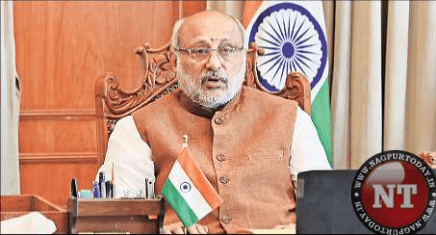Nagpur: Governor of Maharashtra C P Radhakrishnan on Wednesday said that the National Education Policy (NEP) 2020 is set to revolutionise education in the country. He was virtually addressing as chief guest at the UGC Western Zone Conference for Autonomous Colleges on implementing the NEP 2020 organised at the Indian Institute of Management (IIM) Nagpur.
The Governor inaugurated the conference in the presence of Professor M Jagdish Kumar, Chairman, UGC and Dr Bhimaraya Metri, Directorof IIM Nagpur. Academic mentors, directors, principals, and 500 delegates from about 240 autonomous institutions in the Western Zone of India attended the conference.
Radhakrishnan said, “Currently our country is ahead in the education sector offering high-quality education at every stage due to top-tier academic resources, world-class infrastructure, and groundbreaking avenues for research. The NEP 2020 is a transformative step in this direction as it can create long-lasting change in the coming years. It sets forth ambitious goals to bring transformational reforms in education, thus, positioning India as a global knowledge super power. It also ensures that the education system provides high-quality learning to all regardless of economic or social background. It will increase gross enrolment ratio from the current 28% to 50% by2035 and nurture graduates from the higher education system,” the Governor said.
By achieving such goals, the country can realise the vision of Viksit Bharat by 2047. With an emphasis on collective efforts to realise the objectives of NEP 2020 as per the guiding pillars of access, equity, quality, affordability, and accountability, the reforms will elevate the quality of education by focusing on core values, cognitive skills, critical thinking, and problem-solving abilities, the Governor mentioned.
NEP 2020 emphasises multidisciplinary holistic education, institutional autonomy, quality research through the National Research Foundation, professional development for teachers, and technology integration. The recommendations are internationalisation of higher education, governance restructuring, and multilingual education promotion. University Grants Commission (UGC) initiated nearly 50 actions to enable higher education institutions to implement NEP 2020. They create a flexible, multi-disciplinary, globally benchmarked higher education ecosystem in India.
Academic Bank of Credits, National Credit Framework, and Professor of Practice will transform the landscape by fostering student mobility, credit transfer, and industry-academia collaboration to prepare relevant graduates in today’s global job market. “The ‘Apprenticeship Embedded Degree Programme’ is a game-changer. IIM Nagpur is an ideal venue for such conferences as it is distinguished by its commitment to addressing the needs of modern India with innovative management education and research. Its rapid growth and achievements by adopting NEP 2020 are commendable,” the Governor pointed out.
Professor M Jagdish Kumar, said “Optimism drives India on the path to progress. It has many great institutions, an excellent constitution, great democracy, and a solid judicial system. With the world’s most significant education infrastructure, India is the 3rd largest student ecosystem. We also have many challenges to overcome in which educators attending the conference have significant roles to play. This conference will create awareness for exploring the best practices, understand the challenges and find suitable solutions for rapid implementation of NEP 2020.UGC plans to launch many innovative programs in on-line and off-line modes to serve the purpose,” he mentioned.
Dr Bhimaraya Metri, said that as one of the new-generation IIMs established in 2015, it has carved out a prominent position in management education with innovative programmes like Cyber security and Blockchain. “NEP is a gold standard and with NEP 2020 implementation more autonomy is possible for the educators who understand the valuable advantages of NEP and they should consider this as the right time to transform their institutions and offer students new avenues more effectively,” he said














